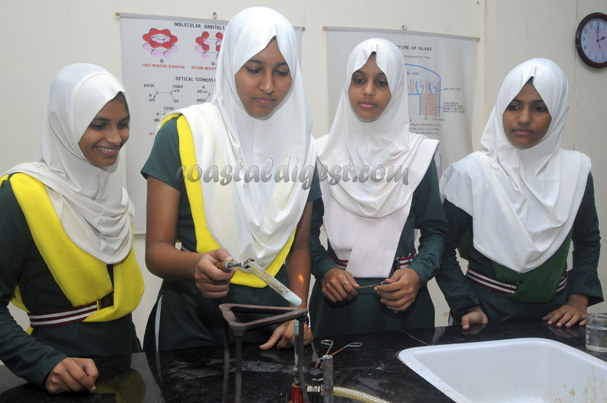
The school is an ICSE school, a model which in itself is a determining factor in students having that extra ‘egde’. The ICSE model has a well established exam pattern which existed in pre-independence era i.e. the British times. The Anglo-Indian Board later transformed into the ICSE Board and hence the essence of British quality of education remained. Since the school has students from Goa, Dharwad, Bijapur, Karwar, Mangalore, Puttur, Madikeri, Chikmagalur, Mysore and the like, shows that it has already gone a step ahead in its attempt to becoming one of the best residential schools in the state offering quality education.
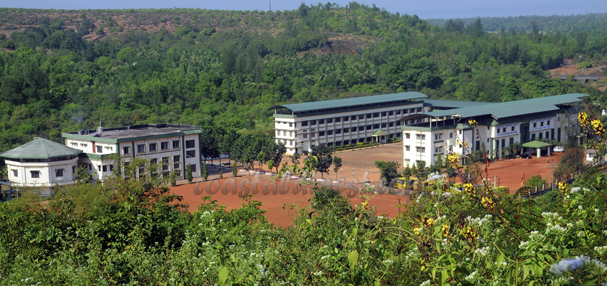
The school possesses an enviable infrastructure with exclusive blocks for PU, primary and high school sections. All of these have smart class facility, theatre systems, interactive boards, modern and updated labs for both ICSE and PU Board syllabuses. There is at the disposal of the students a large library with over 1000 books and which is being upgraded besides a vast playground and sports facilities having indoor and outdoor courts in line with international specifications. The school also possesses a KG activity centre with all the latest Montessori teaching equipments which are rare and expensive, a rarity in Karnataka.
Veterans in-charge
John Mathew, Principal
Green Valley is currently being marshaled along by its veteran Principal John Mathew. Before joining Green Valley National School, Shiroor, Mr. Mathew, was the Principal of Villa International High School, the Republic of Maldives following GCE London Advanced Level Examinations. He has served the Ministry of Education, the Republic of Maldives as a Senior Principal for 13 years in schools affiliated to University of London and Cambridge University for O’ Level and A’ Level Examinations. He was the former Principal of Majeediyya School, the oldest and most reputed school in the Republic of Maldives under the Ministry of Education, founder Principal of Cambridge School, Mangalore, the Principal of MES Central School, Kirpal Sagar International Academy and was an active associate with Ivy League Schools Ltd., Hyderabad, spanning an educational career that extends 26 years of which 22 years as Principal. He is much respected and credited in the Maldives as the first Indian Principal and for having produced some of the best National and International Results and is well familiar with ICSE, CBSE, GCE/IGCSE and International Baccalaureate Syllabus Management and an expert in pioneering schools. He is a gold medalist and holds his Master’s in English Language and Literature, M.Ed. in Education and an Executive MBA in Human Resource Management. He has also completed an Advanced Educational Management Training at Salzburg University, Austria and was trained at John F. Kennedy School, Berlin under the WUM International Exchange Programme and an active member of several international professional bodies associated with School Education and a Deputy Commissioner with Bharath Scouts and Guides.
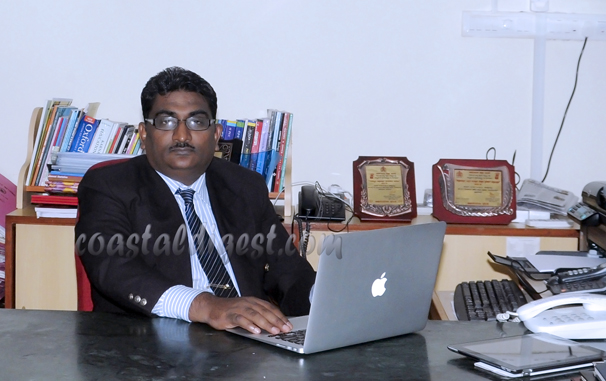
Experiential Learning
The purpose of having all these facilities is to provide a ‘child-centered’ education. The approach is an ‘activity centered’ approach where emphasis is given on learning through experiences. Says Mr. Mathew, the Principal:
“We make children engage in activities and the onus is always on experiential learning. Things which are learnt through experiences stay in memory longer than those which are just mug up from books. If one is to ask you what you had for breakfast a week ago, you are not likely to remember but if you are asked about the items which were served in dinner during your last birthday party, you are likely to remember because that event is full of experiences. We try to do something similar with learning and create situations and scenarios along with the various infrastructural facilities that we have, to enable children learn through experiences”.
The process begins right from the early stages in the school, from the KG and primary levels. “That is the age when there is a greater sense of curiosity and enquiry among children. We provide them experiential learning where they learn more than what normally other kids don’t. For instance, you don’t have to teach the word ‘smooth’ to a child when it can learn the word by feeling the smoothness of texture of an object. Learning happens automatically’, says Mr. Mathew.
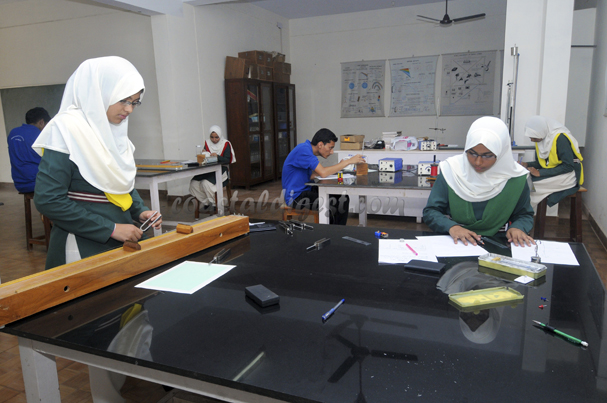
More than just books
Students in Green Valley are exposed to a plethora of co-curricular and extracurricular activities. “Activities are prescribed by the ICSE syllabus as part of internal assessments in the form of projects and assignments. But we go beyond those and provide children with a number of other activities be it cultural, oratory, language clubs and other areas such as sports”, says Mr. Mathew.
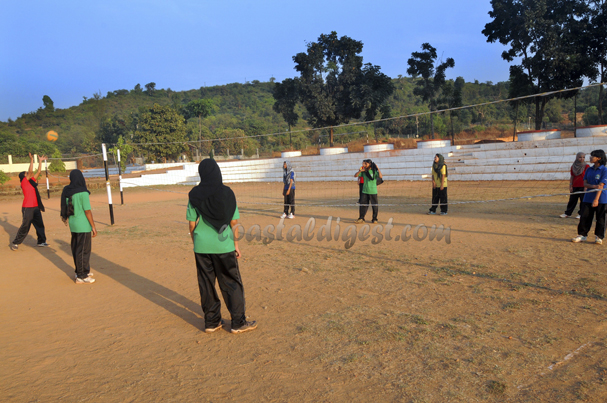
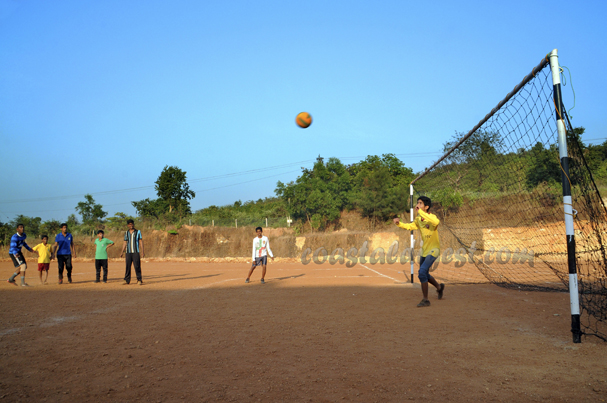
Home away from home
At Green Valley, there are exceptional residential facilities for both school as well as PU students. “The approach of the wardens is also child-centered at our residential facility and there is no room for rigidness. It is an environment which helps children become more responsible. We are lenient with matters of religious practices too and students can perform their prayers and religious practices while they are here. An added advantage of being a residential student at Green Valley is that he/she is under the watchful eyes of the school authorities 24x7 and the school influence on him/her doesn’t end with the completion of school hours. The studies of children in their residential facilities are monitored. The 24/7 stay in a residential school contributes to the holistic development of the child. The situation is more favourable for students having parents who do not find time to address their wards’ studies and other issues because of their work and even students having parents working in Gulf countries. Besides, programmes and activities are held for them. They are given time for leisure, TV watching, play and reading”, says Mr. Mathew.
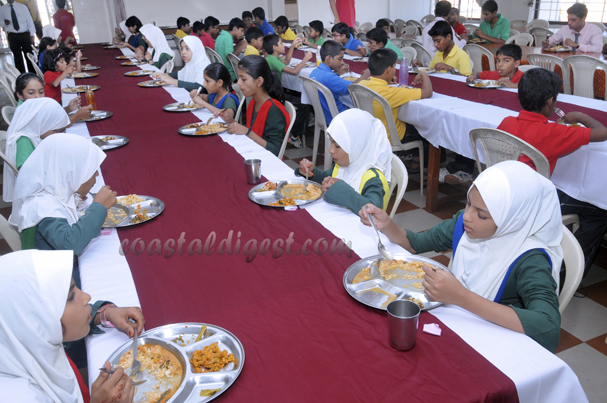
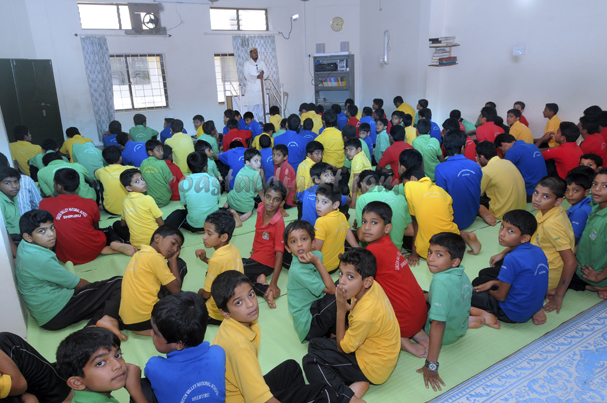
Location an advantage
People have a misconception that Green Valley has lost out by being situated in a not so popular place like Shiroor. “The remoteness of the place is actually an advantage. Children are not distracted and get attracted towards the temptations of the 21st century or so to say the glittery world outside. It is a safe place and a safe environment. The school is located at an area which is free from vibrance, noise and pollution. The place is quiet and ideal for a residential school. It is, on the other hand not that remote either. The place is easy to access with railway stations close by (Byndoor, Shiroor, Bhatkal and Kundapur) and is well connected in the sense that it is not too far away from Mangalore and Udupi. Even in terms of air travel, the place is rather closely accessible from both the Goa as well as Mangalore Airports from either ends”, says Mr. Mathew.
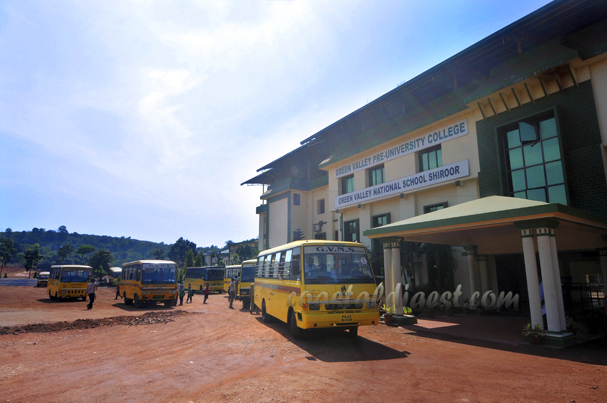
Mixing of cultures
The school being a National school and a residential school at that, there is ample scope for building a student’s broad minded approach. “The students in the future will go into a global world which will demand them to mix with a cross section of the society. The school serves as a model for students where they are exposed to these different cultures as there are fellow students coming from different backgrounds and different cultures studying and living under the same roof. There is a lot of give and take and students learn to respect not just individuals but cultural ethos and institutions as well. Having said that, we ensure that ample opportunity is given to students to maintain their roots and core values.
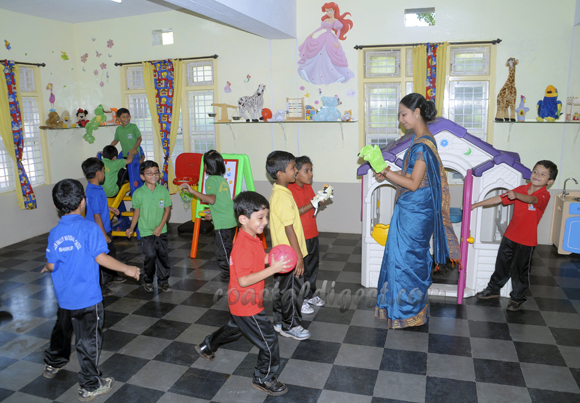
Making children be better gentlemen, ladies in future
The effort at GVNS is always to create good citizens out of its students. “The quality of our education will reflect in their attitude, the way they interact with people and the society at large after they pass out. It has happened to a great extent and we want to continue focusing on that. Success is a continuous process unlike switching light on and off. We have seen changes come about in children. They feel they are being taken care of here. Every child matters in the school. The school is not meant just for the 10th std or II PU students where results are always in focus. We see ourselves as helpers of learning. We do not undermine the ability of the child and confine them to our level. We want to grow them beyond what we are and what we have achieved. We are aware that if children’s energy is curtailed, when they do obtain freedom sometime later in their life, chances are that they might go astray in trying to divert that energy somewhere else. At the same time, we respect the demand of the society that there has to be ethical and value oriented education”, says the Principal.
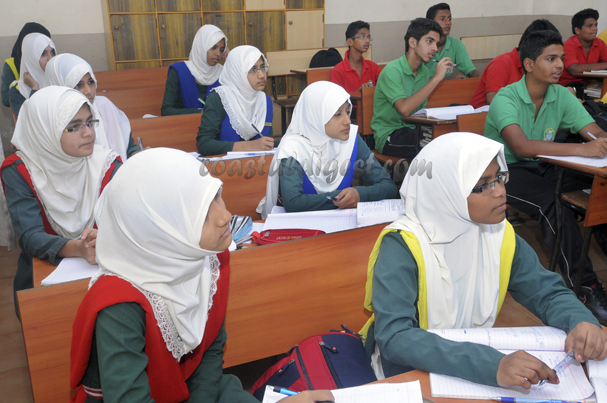
Lesser burden on children
A common complaint made today is that children are overburdened with study materials and activities which are beyond their capacity. But at GVNS, the attempt is always to keep the burden on the child minimal.
“The increased burden is a situation created by publishers of the books. Basically, irrespective of the state board, ICSE or CBSE, we are supposed to follow NCERT guidelines in matters of deciding syllabus for children. For CBSE and ICSE, there are no mandatorily prescribed books up to 8th std. Each school is open to choose the books it wants. Some schools in their ignorance opt for bulkier books getting carried away with their presentation etc thereby burdening the child. We at GVNS have lesson plans and schemes of work. We review our syllabi with our teachers every year and collaborate with other good institutions which use different types of books and whenever we find that there is overfeeding of study material, we minimize it”, reveals Mr. Mathew.
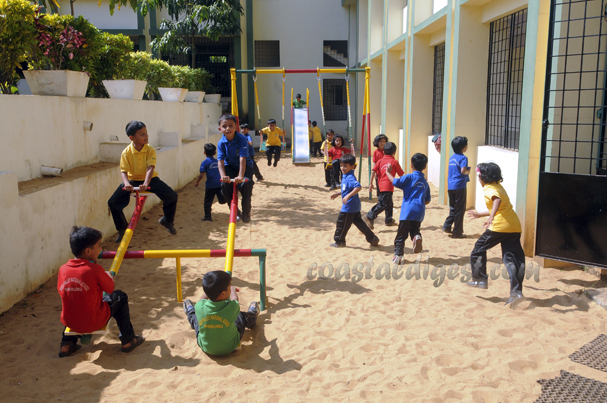
Wilhelmina Mathew, Chief Coordinator and Head of the Department of English
Ms Mathew, an exceptional teacher and administrator par excellence is the Chief Coordinator and Head of the Department of English at Green Valley National School, Shiroor. She is of British Origin and has 23 years of teaching and administrative experience right from Pre-Primary to College level. She worked as a Lecturer of English and Co-ordinator at Secondary and Senior Secondary Schools in India and abroad handling GCE O’ Level and O’ Level Examinations for University of London and Cambridge Examinations. Her recent assignment was as Lecturer of English and Co-ordinator in the Faculty of Education at Villa College, the Republic of Maldives. She is also a trainer and examiner for Trinity College, London Examinations in India. She has also been trained in Montessori Method at Woodlands School and holds her Master’s Degree and B.Ed. from prestigious institutes. She coordinates the English Programmes at Green Valley National School, Shiroor.
Sophisticated programmes to enhance quality of English among students
Ever since taking charge, Ms. Mathew has been working on a slew of projects to enhance the quality of spoken and written English among students.
“We have incorporated a BBC (British Broadcasting Corporation) programme called ‘Muzzy’ where children are exposed to learning fluent English. There are day to day activities wherein they learn better pronunciations. There is a dedicated session for English for 45 minutes every day right from LKG to Grade 6. The idea is to have a strong English foundation when children are small so that they don’t face problems later, which is something I have noticed in a lot of children here in Karnataka. We have story telling activities, role play enactments, and a lot of listening wherein children pick up the language. We use the ‘Cambridge Reading Tree’ and the ‘Oxford Reading Tree’ which are audio visual programmes and after watching those, children have showed improvement in picking up the language. For children in senior classes, we show video documentaries from the BBC and CNN and filmed day to day activities through which children are exposed widely to what is happening around the world. Apart from that, we have essay writing skills, picture composition and picture essays to widen their imagination and other competitions”, explains Ms. Mathew.
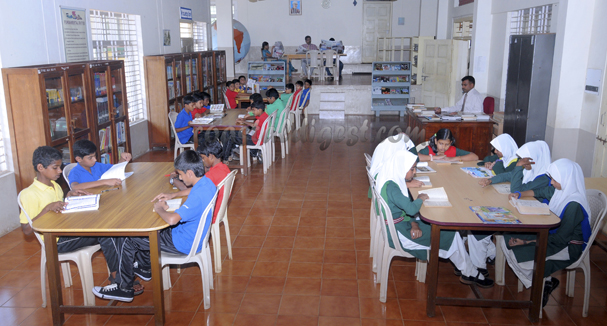
‘Word a day’
Children at GVNS have the ‘Word a day’ programme wherein everyday a student has to bring one new word to the class. “This way, we develop their English and strengthen their vocanulary”, Ms. Mathew says.
That apart, Ms. Mathew has other similar programmes up her sleeve like book reading where students are asked to read a book every month at the end of which a review is held. “The students have to speak about the characters, which ones they liked, which ones they disliked, their opinions on the book etc. In the process, they pick up new words from the chapters. We have to reach out to children beyond text books. We teach them songs because singing is a way of picking up the language well. We have karaoke sessions wherein words appear on the screen as the rhythm is played and this programme is held for students up to class 5. We discourage them from speaking in their mother tongue as they can do it at home anyway but not on school campus as this is the place they need to work on bettering their English”, Ms. Mathew reveals.
GVNS will be the best residential school in the state: Syed Abdul Khader (Bashu), Trustee, GVNS
A tiny project which took birth in Shiroor, Green Valley National School and PU College is now standing tall as a prominent education institution of the region. To provide holistic education to boys and girls alike is the objective of Green Valley. The institution has already crossed enviable milestones in a span of eleven years thanks to the efforts and cooperation of the management, teaching staff, students and parents.
A number of student-friendly facilities are at students’ disposal. Spacious and ventilated classrooms, separate sophisticated hostels for boys and girls, residential facilities for teachers and staff, vast playground, audio visual rooms, an updated computer centre, large library, modern labs and smart class facilities are available at Green Valley.
In addition to the experienced teaching staff, the school is fortunate to have a dynamic new Principal in John Mathew and Chief Coordinator in Wilhelmina Mathew. Their expertise and experience in the field of teaching will certainly prove beneficial for the students. Green Valley is marching forward by winning hearts its students through its student friendly teaching staff and use of latest technology.
That the school has excellent residential and hostel facilities for students, this is a golden opportunity for NRIs who want their children to obtain quality ICSE education in their homeland.
Students of the school as well as PU sections are scaling greater heights and achieving milestones every year. Green Valley will leave no stone unturned in raising the bar and enhancing this quality. The school does not compromise on quality and is well on its way to becoming the best residential school in the state.
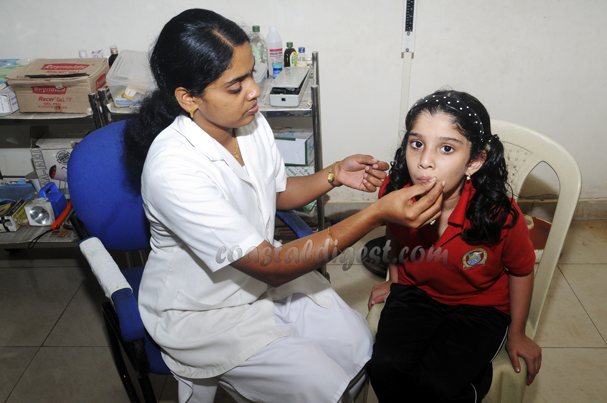
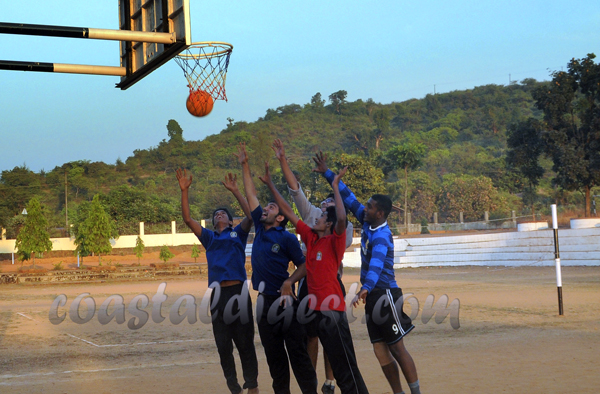





Comments
Add new comment